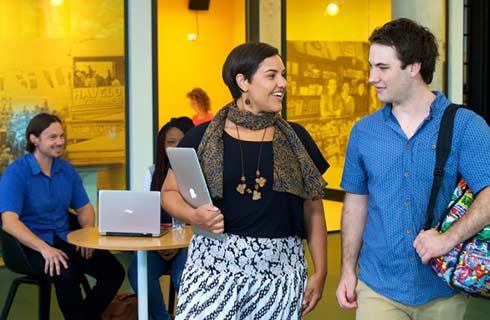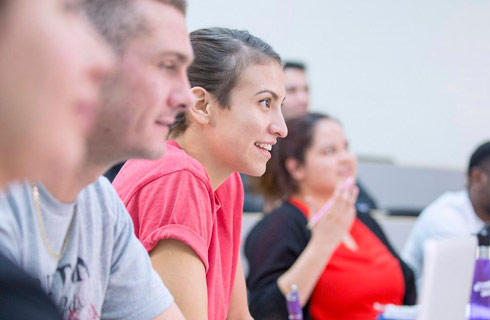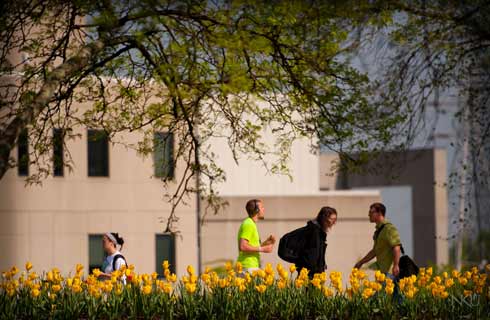生物化学理学学士
Bachelor of Science in Biochemistry

学历文凭
Bachelor Degree

专业院系
Department of Chemistry and Biochemistry

开学时间

课程时长

课程学费

国际学生入学条件
IELTS - 6.5 (6.5 in Speaking and 6.0 in other three components)
TOEFL iBT - 80 (20 in each Component)
IDP—雅思考试联合主办方

雅思考试总分
6.5
- 雅思总分:6.5
- 托福网考总分:80
- 托福笔试总分:160
- 其他语言考试:PTE - 53 (49 in each Component)
CRICOS代码:
申请截止日期: 请与IDP联系 以获取详细信息。
课程简介
Chemists and biochemists study the fundamental processes that govern the natural world, including atomic structure and how atoms interact to form molecules and materials. They study the mechanisms of chemical processes, including those that underpin living systems such as the transfer of information from DNA to RNA to proteins. They work to develop simplifying models (theories) that permit the correlation and explanation of observations about the behavior of matter. Chemical principles are fundamental to the understanding of subjects ranging from the molecular biology of life to the structure of rocks and minerals. Chemistry and biochemistry provide an essential foundation for the medical sciences, engineering (especially chemical engineering), electronics, energy, environmental sciences, materials science, pharmacy, and virtually all manufacturing processes.<br><br>Chemistry and biochemistry are active branches of science that are vital to human existence. Inasmuch as the field embraces all aspects of the material world, it is subdivided into five areas of interest. Examples of these diverse areas include the regulation of protein synthesis, cellular signal transduction at the molecular level and proteometrics (biochemistry), design and synthesis of medicinal compounds (organic chemistry), design and synthesis of new molecular structures and materials (inorganic chemistry), spectroscopic study of energy transfer and molecular structures (physical chemistry), and analysis of medicinal compounds, biological materials, and contaminants or trace elements found in the environment (analytical chemistry).<br><br>Chemistry and biochemistry involve far more than test tubes and beakers. They include sophisticated methodologies such as recombinant DNA technology, working with a variety of instruments such as mass spectrometers, calorimeters, chromatographs, ultracentrifuges, lasers, X-ray diffractometers, electron microscopes and nuclear magnetic resonance spectrometers, all of which are used by undergraduate chemistry and biochemistry students at BYU. Computers also play an important role in these disciplines, with applications varying from simulation of molecules to the collection and analysis of data. The chemistry and biochemistry curricula are both rigorous and intellectually rewarding.<br><br>Program Outcomes: <br>Chemistry and Biochemistry Fundamentals<br>Program graduates will have demonstrated a mastery of core concepts and principles in the five chemistry sub-disciplines: analytical chemistry, biochemistry, inorganic chemistry, organic chemistry, and physical chemistry. They will demonstrate an indepth mastery of biochemistry.
相关申请
 预科
预科 奖学金
奖学金 实习机会
实习机会 在校学习
在校学习 跨境学习
跨境学习 校园授课-线上开始
校园授课-线上开始 在线/远程学习
在线/远程学习
开学时间&学费
学费信息仅供参考,请与IDP联系以获取详细信息
| 开学时间 | 时长 | 学费 | 地点 |
|---|
关于杨百翰大学

杨百翰大学(简称BYU)是一所私立四年制大学,成立于1875年,隶属摩门教,是全美最大的教会大学。最佳的学科是计算机科学、初级教育、工程、商科(尤其是会计),此外,大众传播和制造科技也备受学生的欢迎。新生入学时,必须签署一份约章,包括不饮酒、不吸毒、不抽烟,甚至不喝咖啡或茶。学生必须选修七学期的宗教课程,校内教规颇严。大学只有四分一的学生可以在五年内毕业,因为修毕第一年后,近八成的学生都会依照教会传统,出外做两年传教士。百翰大学只有四分之一的学生可以在五年内毕业,因为修毕第一年后,近八成的学生都会依照教会传统,出外做两年传教士。教友子弟入学都可获减年学费950美元。如学生不是摩门教徒,收费则增加。《美国新闻与世界报道》评为二级国家级大学,全美学术排名《Academic Reputation Ranking》第67。用于学生服务的特殊设备包括地球科学博物馆、地震测量仪器、电影制作部门、植物科学研究室、乳品动物农场、语言中心等。大学设有多达4400个奖学会,金额由600~2850美元不等.此外,教会还有专为教友开设的学生贷款,全校有六成学生都获得资助。特殊设备包括地球科学博物馆、地震测量仪器、电影制作部门、植物科学研究室、乳品动物农场、语言中心等。图书馆:藏书 174万册,缩微资料131万件,期刊16722种。计算机:IBM 4341,Digital VAX/VMS。科研机构和实验室:本森农业和食品研究所;蒙特·L·比恩生命科学博物馆;肿瘤研究所;高压数据中心;环境分析实验室;艾林研究所。杨百翰大学(BrighamYoungUniversity)在美国大学排名2016为第66名。
本校相关课程

法学博士/会计学硕士
学历文凭
Combined Graduate / Doctoral Degree
开学日期
课程费用总额


法学博士/工商管理硕士
学历文凭
Combined Graduate / Doctoral Degree
开学日期
课程费用总额


野生动植物保护哲学博士
学历文凭
Ph.D.
开学日期
课程费用总额


心理学哲学博士-临床
学历文凭
Ph.D.
开学日期
课程费用总额


心理学哲学博士
学历文凭
Ph.D.
开学日期
课程费用总额


生理学和发育生物学哲学博士
学历文凭
Ph.D.
开学日期
课程费用总额

其他相关课程

生物化学理学士(荣誉学位)
 滑铁卢大学
滑铁卢大学学历文凭
Bachelor Degree with Honours
开学日期
课程费用总额


生物分子科学哲学博士
 劳伦森大学
劳伦森大学学历文凭
Ph.D.
开学日期
课程费用总额


生物化学理学学士
 劳伦森大学
劳伦森大学学历文凭
Bachelor Degree with Honours
开学日期
课程费用总额


生物化学与分子生物学理学学士
 达尔豪斯大学
达尔豪斯大学学历文凭
Bachelor Degree
开学日期
课程费用总额


生物化学理学学士
 温尼伯大学
温尼伯大学学历文凭
Bachelor Degree
开学日期
课程费用总额


生物化学与分子生物学理学学士
 特伦特大学
特伦特大学学历文凭
Bachelor Degree
开学日期
课程费用总额










 美国
美国